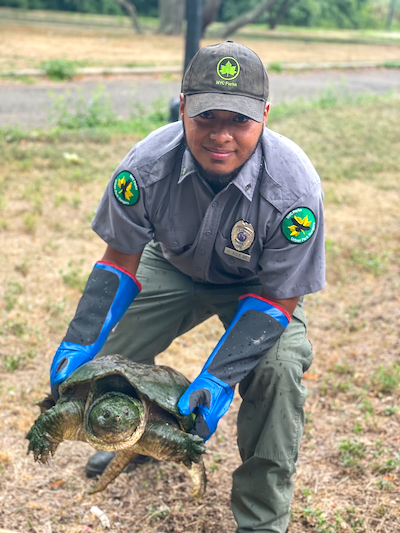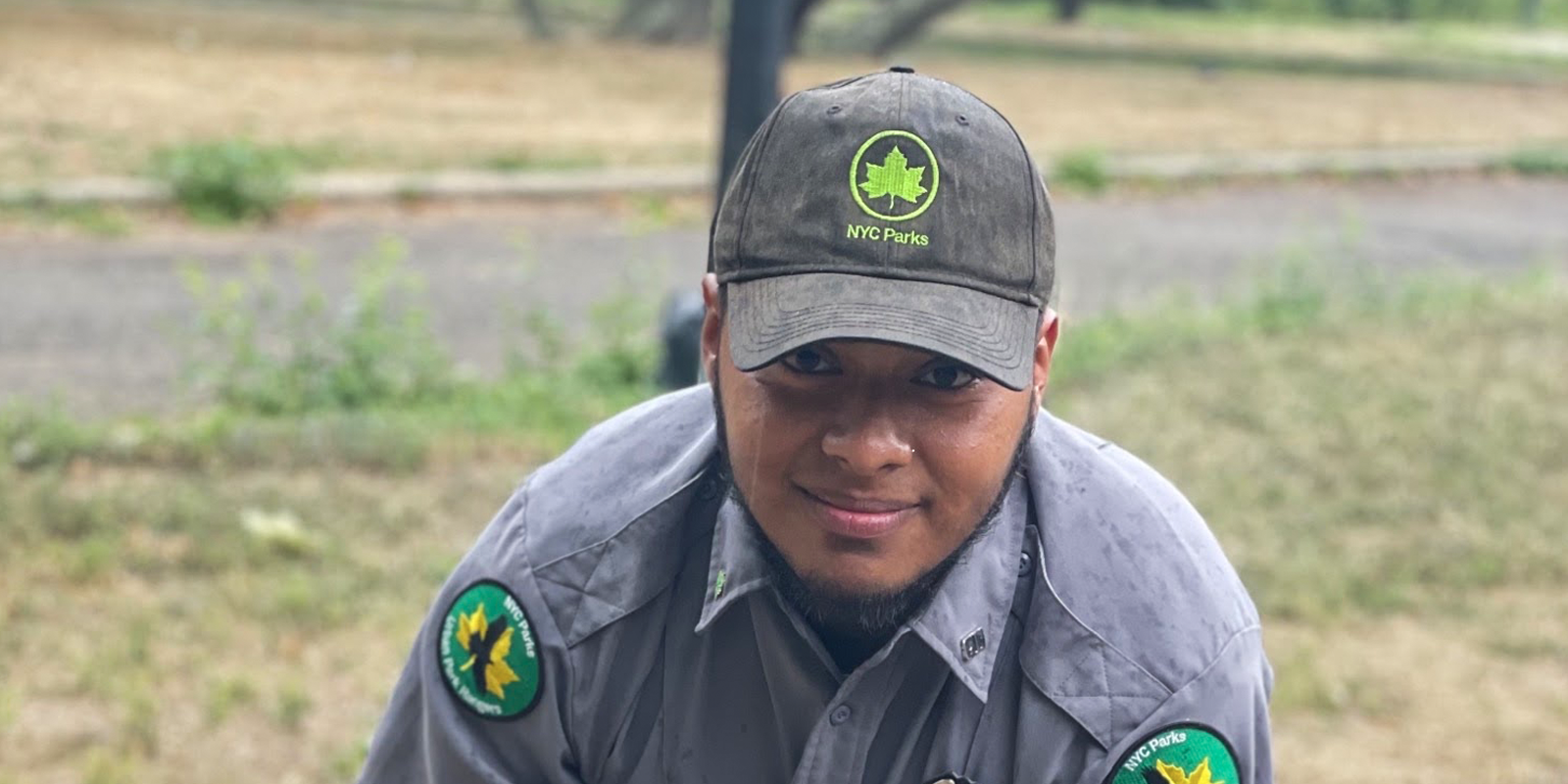
Ask most people what they think of when they think of a park ranger, and you’ll probably get a romantic image of a lone figure perched high above a Western vista, scanning for smoke.
But just as our wild areas need trained professionals to safeguard them and engage the patrons who visit them, so do our cities’ parks. And those professionals – like urban park ranger and AFSCME Never Quit Service Award winner Harry Aguilar – bring their own unique set of skills to the job.
About a year ago, 26-year-old Aguilar was hired alongside fellow Local 983 (DC 37) member Salvatore Asaro as part of a new cohort of New York City urban park rangers.
Assigned to the borough of Queens, Asaro quickly noticed that Aguilar brought something special to the role, particularly when it came to connecting with the public.
“Queens is one of the most diverse places on the planet,” explains Asaro. “It’s the biggest borough. Millions of people live here and there’s a constant influx of immigrants. You have to be really versatile. You have to read body language, especially when you don’t understand what people are saying.”
Asaro recalls an episode last spring when they’d received a call about a seal that had washed up on Rockaway Beach. After determining that the animal wasn’t sick or injured, they taped up the area to keep the public away from the animal.
However, the people who’d gathered to look at the creature were angry they weren’t doing anything. They didn’t realize that leaving the animal alone was the right move.
It was Aguilar who quickly diffused a situation that could’ve gotten even more heated, Asaro says.
“When people are abrasive, Harry can speak to them in a smooth way,” says Asaro. “He’s very attenuated to how he’s perceived. He’s got a very natural and fluid way of understanding who he’s talking to.”
For his part, Aguilar appreciated that the public wanted to help, and saw it as a chance to educate them.
“The seal was on his migratory path and he just was resting,” says Aguilar. “But there were no abnormal behaviors. So, I explained that maybe he had just sunbathed too long. I love being able to communicate this to people. I don’t know how to explain it: they’re learning something and I’m learning how to relate it to them.”
Aguilar says the fact that he was born and raised in the Richmond Hills neighborhood of Queens gives him a huge advantage when interacting with the public.
A more harrowing experience this past year illustrates the indefinable but essential trait that Asaro has witnessed.
Aguilar was on a foot patrol and could hear what he described as a “ting.” There had been reports of people cutting down trees and Aguilar suspected the noise was one of the perpetrators.
“I looked around and saw a gentleman with a machete,” said Aguilar. “I approached him – he didn’t seem agitated or upset – but I approached him cautiously. I asked him how he was, what he was doing. He said he just needed a little bit of branches to hold up his tomato plants in his garden.”
The man didn’t think there was anything wrong with chopping down a few limbs of a tree.
“Thankfully, he was very understanding,” said Aguilar, who calmly explained to him why he couldn’t continue to cut down the trees.
A situation that might have turned volatile and resulted in a call to the NYPD became an opportunity for education, to overcome cultural barriers.
“Approach is 100% of the job,” says Aguilar. “If you have a familiar voice, someone you might have grown up with, you’re more inclined to listen, to say ‘I trust this guy.’”
Growing up in Queens and coming from a family of immigrants – his parents are from El Salvador – Aguilar understands the different viewpoints that patrons bring to Queens’ parks. He also knows what it was like to grow up in a place where no one taught you about your natural environment.
Now, however, he can be the resource he never had growing up as a kid.
“I had an event at my old school where I explained to kids what I did as a park ranger,” said Aguilar. He says it was a powerful moment, being able to convey his passion for the outdoors and get kids excited about the natural world.
“What drives me is to be interactive with my community,” says Aguilar. “There’s a lot of folks like me where environmental education wasn’t there for them. If I had someone willing to put these ideas on me – that there are jobs you can get being outdoors – I’d have been more into school.”
Among the lessons that Aguilar imparts is that the sometimes-irksome wildlife New Yorkers encounter (think racoons, or in Queens parlance, “trash pandas”) and might be inclined to eliminate, were here long before we were.
“We happened to encroach on their land,” says Aguilar. “Our parks are what we have to offer back to them.”
